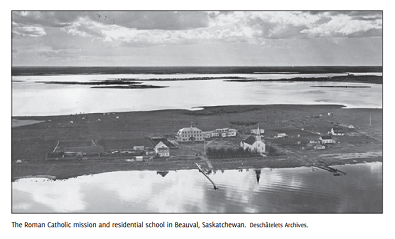Saskatchewan First Nations leaders are speaking out against a Parole Board of Canada decision to release a residential school abuser from prison.
Paul Mary Leroux, 76, has been serving time for gross indecency and indecent assault committed more than 50 years ago against boys between the ages of 11 and 15 at Beauval Indian Residential School when he was a dormitory supervisor.
Leroux was granted day parole in late April and will receive full parole in July, which FSIN’s chief says is a “slap in the face” to his victims.
In a news release issued on Tuesday, FSIN Chief Bobby Cameron said the parole board decision “makes a mockery of all the work of the Truth and Reconciliation Commission. This sexual predator is basically allowed to destroy the lives of innocent children with minimal consequences.”
Meadow Lake Tribal Council Chief Eric Sylvestre said he wants a full review of the parole board’s decision, which he said “dismissed” and “disregarded” the victims. He said the Parole Board of Canada should make its decisions through consultation with the victims.
The parole board decision does make reference to the “serious harm” that occurred to the victims which is captured in victim impact statements on file.
The decision directly addresses Leroux, saying “(the victim impact statements speak of the physical and psychological harm from your criminal actions. The victim impact statements speak of the same and anger your actions placed upon your victims.”
Leroux’s release plan is a continuation of a lifetime of painful experiences for his victims, who found the strength to come forward as men to see their abuser held responsible for what he did, said Sylvestre.
“The victims had to relive and face their abuser. They’re being revictimized again,” he said.
The decision focuses on the rule of law and assesses things like Leroux’s risk to reoffend, the factors in Leroux’s life that support release into the community, and his behavior in prison.
Mixed in with that is a statement that Leroux “adamantly denied committing” the Beauval offences.
The document refers to Leroux’s time served for sexual offences against underage males at a residential school in Inuvik between 1967 and 1979, stating “You deny committing (the Beauval) offences and believe that these charges are due to the publicity of your convictions in 1998 for similar offences.”
Sylvestre said healing from something as horrendous as what Leroux did takes a long time, and affects not just the victim, but the whole community.
“The communities have to go through a process of healing from this and other abuses. It takes years to do that,” he said, adding that, despite setbacks like this, moving forward is a priority.
As a sex offender, Leroux will be subject to a number of conditions once released and the Parole Board of Canada assures the public if he breaks those rules he will return to prison.
Leroux is approved to live with his partner, and had requested for day parole to be served in the lower mainland area of British Columbia.
